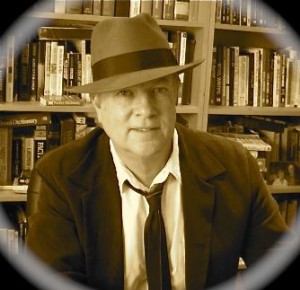JAMES SCOTT BELL was born August 10, 1912, in Arlington, Kansas. His father worked for the Chicago, Rock Island and Pacific Railway, but quit in 1918 and moved his family of ten to Tulsa, Oklahoma, to work the oil fields. When Jim wasn’t in school or working odd jobs, he was reading Zane Gray, Edgar Rice Burroughs and pulp magazines like Black Mask.
When the Depression hit, Jim rode the rails to Los Angeles and got a job as a cub reporter for the Hearst newspaper, The Examiner. By day he tracked down stories of murder, fraud and corruption. By night, in his one room apartment on Bunker Hill, he pounded out short stories for the detective magazines. He was published almost immediately alongside such luminaries as Horace McCoy, Erle Stanley Gardner and Dashiell Hammett. When his crime novella, One More Lie, hit the racks, Jim garnered instant national fame. The story sold to MGM and became the classic 1941 film starring Joan Crawford and Robert Taylor.
Jim became one of the most sought after screenwriters in Hollywood and contributed as much as anyone to the post World War II film noir genre. He continued to put out suspense stories for the paperback original market and pulp magazines.
In 1952 Jim and Robert Mitchum got into a fight with two henchman of mobster Mickey Cohen, who had been bothering a cigarette girl at the Brown Derby. One of the thugs pulled out a .38 and shot wildly, hitting Jim just above the heart. At the hospital Jim refused sedation and insisted that a studio secretary be summoned so he could dictate the final pages of a screenplay due the next day. That script went on to win an Academy Award.
Jim kept up his prodigious output of short stories, novellas, full length books and screenplays right up to his death at the age of 99. He had just typed The End on a novel when his heart gave out. His last words were, “Don’t forget the mayonnaise.”
Here is a picture of James Scott Bell in his office at Warner Bros. in 1947.
# # #
This flight of fancy is based on how I feelas a writer. I always admired the pros, the ones who could deliver the goods time after time. The writers who wrote to make a living and yet found a way to make their writing come alive.
What about you? If you could write your own writer biography, and it could be from any era, what would it look like? What sorts of books would you have written? Who would be in the movies based on your books?
This is not a mere game. Use this exercise to focus on your long term goals as a writer. Ask yourself how your imaginative bio might inform your writing today.
Go ahead. What are some of the entries in YOUR writer’s biography?
NOTE: I wrote a little bit more of my philosophy of pulp fiction writing over on Rachelle Gardner’s blog.

